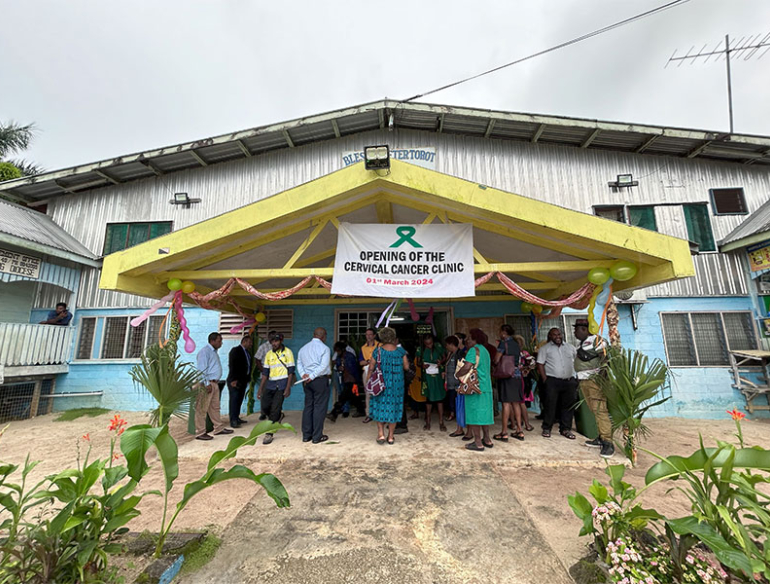Cervical cancer is a disease of inequity associated with stigma and discrimination, affecting women at a time they are critical to economic and social stability, and is often accompanied by overwhelming costs impacting on families and communities. Despite having the knowledge and tools to stop this preventable disease, it is still the 4th most common cancer, and 4th leading cause of cancer death among women globally. WHO-IARC has estimated that in 2020, there were 336,574 women diagnosed and 190,915 died from cervical cancer in the Western Pacific (WP) and South-East Asia (SEA) regions, accounting for more than half of the cases diagnosed worldwide (WP 24% and SEA 32%). More than 90% are estimated to be from low- and middle-income countries (LMICs). This reflects a huge disparity in effective cervical cancer prevention and control mechanisms both between and within nations.
The Elimination Partnership in the Indo-Pacific for Cervical Cancer (EPICC) is made possible by a $16.5 million regional aid grant from the Australian Government. It will leverage longstanding local, regional and international partnerships to accelerate the elimination of cervical cancer in the Indo-Pacific region, coordinated with other Australian Government-funded and international efforts.
EPICC builds on the successes of the Eliminating Cervical Cancer in the Western Pacific (ECCWP) program, funded by the Australian Minderoo Foundation, which has significantly advanced the cervical cancer elimination agenda in Vanuatu and Papua New Guinea, and is also jointly led by the Kirby Institute.
EPICC sets out a four-tiered country approach to identifying and meeting policy objectives essential to the development of sustainable cervical cancer control programs. Partner countries (Papua New Guinea, Malaysia, Timor-Leste, Solomon Islands, Vanuatu, Tuvalu, Fiji and Nauru) are tiered according to readiness, gaps and priorities in relation to end-of-program outcomes.
Tier 1: Support establishment of national sustained elimination programs;
Tier 2: Sub-national expansion of current programs to support national readiness;
Tier 3: Implementation of demonstration programs for future scale-up to advance co-design, policy development, and strategic planning; (Nauru implementation will not be funded through PHR 1)
Tier 4: Advance co-design, policy development, and strategic planning to support readiness for future implementation.
EPICC is supporting Pacific and Southeast Asian countries to have more resilient, sustainable and equitable public health systems, and to progress firmly down the path towards cervical cancer elimination.
EPICC has a core structure of six priority areas of work (below) to support in-country partners achieve the WHO ’90-70-90’ cervical cancer elimination coverage targets. Technical and program management support are tailored to country-specific priorities, needs, gaps and readiness, and implementation plans co-designed with in-country leaders, stakeholders, partners, and communities.
- Strengthen primary cervical cancer prevention through HPV vaccination.
- Co-design, introduction and scale-up of HPV-based cervical screening and treatment for cervical pre-cancer.
- Laboratory strengthening for cervical screening and early treatment.
- Co-design and introduction of canSCREEN™ Digital Health Registry to strengthen individualised care and clinical follow-up, and foster evidence-based health service delivery models.
- Strengthen clinical management and palliative care and support for invasive cervical cancer.
- Policy development and population-based modelling across all pillars of the cervical cancer elimination strategy.
The program is implemented by the EPICC consortium. The consortium is led by the University of Sydney and includes the Australian Centre for the Prevention of Cervical Cancer (ACPCC); the Kirby Institute at UNSW Sydney, Family Planning Australia (FPA) the National Centre for Immunisation Research and Surveillance (NCIRS) and UNITAID. National partners include Ministries of Health, Provincial or District Health Authorities, and Civil Society Organisations.
The EPICC program also collaborates with global and national strategic partners with expertise in primary prevention through HPV vaccination, secondary prevention through screening and treatment of pre-cancer, and cervical cancer treatment and palliative care. Global implementing partners include; the Union for International Cancer Control (UICC), the International Gynaecologic Cancer Society (IGCS), and the National Cancer Institute (NCI/NHI). National partners include Ministries of Health and Civil Society Organisations.
EPICC is supported by the Australian Government under the Partnerships for a Healthy Region (PHR) initiative.




